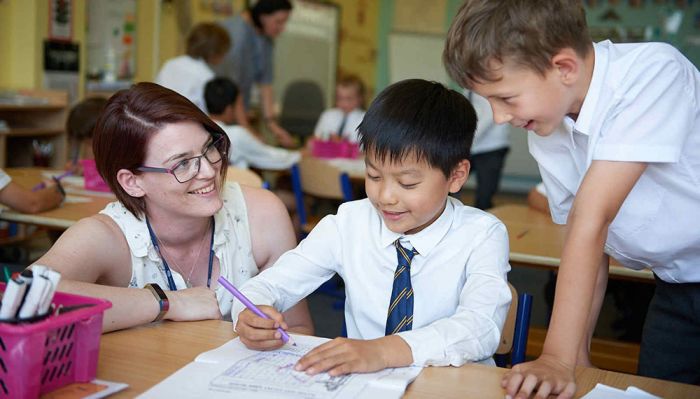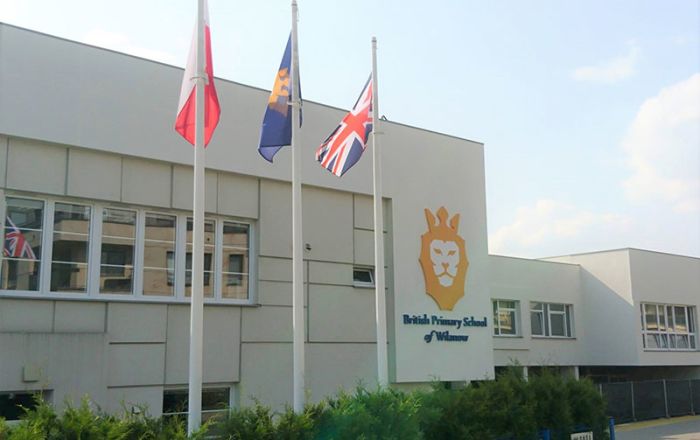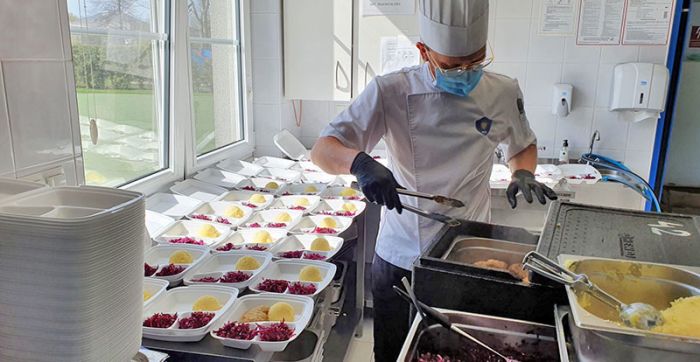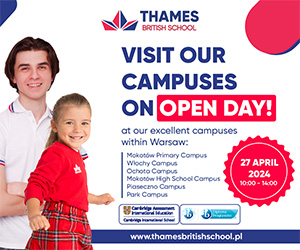On this page:
- History
- Students
- Teachers
- The specifics of the school
- Cambridge and COBIS
- Challenges
- Yellow Plate action
- Teaching at the time of coronavirus

History
Our Kids: How did it happen that you came to Warsaw?
Tom McGrath: My history with Warsaw began in the 1990s, when I started working in another Warsaw international school as a teacher in 1998. After some time I became the headmaster of the primary school and then the headmaster of the whole school. I worked there for 10 years. My family and I decided to travel the world and started working in the Cayman Islands as the headmaster of an international school. Then we were in Portugal, where I was also the headmaster of an international school. Later we decided to come to Warsaw with my family for three years. I’m now the headmaster of this school.
Our Kids: How do you see the differences between these professional experiences?
Tom McGrath: The school in Portugal was founded in 1896 and our school in Warsaw was founded in 2014. It's a difference of more than one century of building tradition. But my current job is probably the most fascinating professional experience, because I took the position of headmaster at a very early stage in the history of the school. This gave me the opportunity to actively participate in creating its character, value, and identity. I’m extremely pleased with this work. I’m the second headmaster of this school. I took over from school founder, Chris Nichols, after he served for two years. The school has been a British school since its inception, with British teachers and a British program.
Students
Our Kids: What are the proportions of Polish students and pupils who come from other countries?
Tom McGrath: About 50% of our students are from abroad, and these percentages vary depending on the age of the students. A higher percentage of Polish students from the lower economic classes, and we have more foreign students in older classes. Sometimes foreign companies do not pay tuition fees in international kindergartens for their employees' children, but they cover the costs of elementary school, and therefore we have more foreign students in elementary school. But in general, we can say that we have more and more children from abroad. Warsaw is becoming increasingly attractive to foreigners.
Our Kids: How many countries do your students come from?
Tom McGrath: Around 35. But of course it's not that easy—when in class, you’re asked, "where are you from?" There are children who raise their hand four times because they have four national identities. Recently, I heard of a child who’s Polish, Swedish, American, and Malaysian, because he has family connections with each of these four countries. I think that identity is very important—I always feel Irish abroad, because I grew up there, and my daughters gained more Polish and international identity over time. It's a matter of experience.
Our Kids: Do Polish children usually have both parents from Poland do they come from mixed families?
Tom McGrath: It's different. Some children come from families where one parent is Polish and the other comes from another country. But there are also families where one or both parents are Polish but grew up in Great Britain, so they have Polish identity, but they are really British. There are also families where both parents have Polish passports but they can be called international families because they worked in many places abroad and children went to international schools, and now they are in Poland again. We at our school want pupils who have an "international mentality." It doesn't really matter where they come from as long as they have an international attitude towards the world, i.e., they feel comfortable in an international environment.
Our Kids: And the youngest children in the nursery—is this a large group of children in your institution?
Tom McGrath: We have more and more children in the nursery and at higher levels—now almost complete. We accept a maximum of 32 children in one year, 36 to "Reception" (four-year-olds) and 36 in class I (Year 1). We strive to ensure that the proportions of Polish and foreign children are even. Of course, the groups/classes are small.
Our Kids: Have many students have gone through the entire education cycle in your institution?
Tom McGrath: Polish students are usually with us the longest. Families from abroad, especially diplomats or business people, staying in Poland on various contracts, usually leave after 3 to 5 years. We have several students who have been with us from the very beginning. We recently celebrated this with these students. It's great to watch our students—how much they change and mature.

Teachers
Our Kids: And who are the teachers teaching in your institution? Where do they come from?
Tom McGrath: Because we are a Cambridge primary school and our initial teaching is based on the English program (Early Years English National Curriculum), we use the following model: the primary teacher in the class is British, but there is always a supporting teacher in the same class, who is most often a Pole with excellent English skills. So we have two teachers in each class. As an international school, we are released from many program obligations that the Ministry of Education enforces in Polish schools, but we’re obliged to teach Polish as a mother language (Polish children) and as a foreign language (foreign children). It’s this Polish teacher who knows children very well that teaches Polish as a native language, and a second supporting teacher teaches Polish as a foreign language.
Our Kids: Foreign students also have to teach Polish as a foreign language?
Tom McGrath: Yes, they have to teach Polish—they have one lesson a day.
The specifics of the school
Our Kids: How would you describe to the families interested in you its specificity and special character?
Tom McGrath: In my opinion, the most important thing is that our school is built around values. Our symbol is the Lion and we are constantly talking about how great are its characteristic features and values. This issue is crucial and present in everything we do at school. There is also a "value of the week," which is the focal point of everything we teach and what we do in a given week, e.g, respect, courage, perseverance, and coping with failure. So what we teach for a given week focuses on this value and has it built into it. The first lesson in a given week begins with just discussing this value, and the last lesson in the week is a summary of how we worked on this value. I’m most proud of the fact that education in our school is based on values.
Good and healthy nutrition is also very important in our school. In many schools, children eat meals prepared and brought by catering companies. However, we employ our own staff who prepare food for children. All our students must participate in the nutrition program.
Of course, the best feature of the school is the students themselves—we’re very proud of them. We’re happy to see that our values, which we pass on to them, really give results and are important to them. Whenever I want to show our school to parents interested in the school, we let a student show them around. Unfortunately, this isn’t possible right now, due to the coronavirus.
Cambridge and COBIS
Our Kids: Your school is a member of the organization COBIS (Council of British International Schools). The school implements the Cambridge Assessment International Education program—what does this mean and what does it give the school?
Tom McGrath: Let's start with Cambridge. In 2019, we underwent the full accreditation process to obtain the right to the title of school that has the right to implement the "Cambridge Assessment International Education" program (Cambridge in short). This means that we implement the Cambridge international curriculum at the primary level—from Year 1 to Year 6 (Cambridge primary program), and then the Cambridge secondary program (Years 7 to 9). In Great Britain, primary school ends at Year 6, not after Grade VIII, as in the Polish system. The Cambridge program is international and we considered it particularly useful for our teaching model. At the end of each year, there are tests showing the students' progress, and in years 6 and 9 students pass the exams. Our students were to take the exam after year 6 for the first time, but due to a pandemic these exams were cancelled.
When it comes to our membership in COBIS, we were the first school in Poland to go through the so-called compliance program. In 2018, we were visited by representatives of the COBIS organization, who recognized our value-based program as unique. Now we were to obtain COBIS accreditation, which is even higher and the highest level that can be obtained from COBIS, but the visit regarding accreditation was to take place in May and, of course, was unfortunately canceled and postponed until the fall. We had to provide accreditation documentation six months earlier, and the next stage of the process is the visit of four people from COBIS, who assess our progress. We will become—I hope—the first school accredited by COBIS in Poland. It’s very important to us that the school gets this accreditation relatively soon.
Our Kids: Is this just a matter of prestige or are there other reasons why it is important?
Tom McGrath: Of course, this is a matter of prestige, but also a guarantee of the quality of our institution, well recognized by parents from abroad, whose children sometimes attended a COBIS-accredited school in another country. This is also important when recruiting teachers—when British teachers see that the school is accredited by COBIS, they’re happy to work here. The accreditation process also requires us to reflect on what we do and how we develop, and as such, is very valuable to us.

Challenges
Our Kids: What challenges do you face in your work?
Tom McGrath: When a new school is created, its vision is of course the most important thing. Fortunately, we had a common vision, so we passed this stage without any problems.
We also considered the possibility of opening our own high school, but we came to the conclusion that we wouldn’t implement this idea and for some parents it may have been a disappointment.
The reconstruction of the school was a big challenge. In September 2019, a new wing of the school, thanks to which we added three new classes, a new teacher's room, and we expanded our kitchen. It was a very large undertaking, and we already know that another expansion will be necessary.
Of course, finding and retaining good teachers is not easy, but because Warsaw is becoming increasingly popular and the position of our school is growing, we manage to get high-caliber teachers.
It’s also interesting that we increased our tuition fees during a pandemic (which was necessary because our school is expanding and of course we need funds to implement more and more ambitious plans), but we are glad that parents reacted very positively to this.
Of course, the entire coronavirus pandemic period is a great challenge, but we’re very pleased with how we managed to respond to this challenge. And yet it was necessary to meet the expectations of parents, deal with additional work for teachers and make these difficulties and challenges bring something good and turn the crisis into positive experiences.
Yellow Plate action
Our Kids: And in this difficult situation, you decided to do something extremely positive—take part in an unusual action. Please tell us more about this.
Tom McGrath: This is the Yellow Plate action—preparing free meals for children from poorer families. Of course, our students are also involved in this campaign, but naturally at a distance because they can't be at school. Their parents support us very much in this campaign, also collecting money for it. As I mentioned, many schools organize student nutrition through external caterers, while we employ our kitchen staff and they are a very important part of our team and our school. When the school closed due to the coronavirus, we faced the problem of unemployment for our kitchen employees—wonderful employees of our school. We could, of course, release them temporarily or send them on vacation, but we thought that there was another solution.
Well, that's when this interesting and important action appeared. There are many needy children in Poland and Warsaw. Some of them received food in public schools they attended. This program was supported by various charities. But when these schools were closed due to the coronavirus, this help was stopped. We contacted charitable foundations and established cooperation with the Kulczyk Foundation, with which we prepare meals for children.
We’re currently preparing 320 meals a day. For many children, this is the only meal they eat during the day. In times of crisis, poor people suffer the most. Our idea is always to act on a local scale, wherever possible. And marginalized people need our help the most. For our children, this is a very important lesson that we are all extremely privileged, but this privilege carries the responsibility of helping others and caring for others. In our school, this is a very important idea, consistent with our values.

We also work with other charities, such as Smile Warsaw, which provides hot meals for homeless people on Sundays. This has been our main assistance campaign for the last two years, for which we collect funds.
It also gives our students the opportunity to meet homeless people, and not in situations that can be described as very unpleasant for both parties. This time they have the opportunity to meet them with a smile, and that's a big difference.
Teaching at the time of coronavirus
Our Kids: How is your school doing during the pandemic?
Tom McGrath: I sent my first letter to my parents about the coronavirus in January. We really wanted everyone to be aware of the impending threat. Maybe because I was abroad and worked in many places I felt that this threat was coming. Of course, the feeling that something may come and the threat itself are two different things.
The crisis hit when we returned from the winter break. We opened the school on March 9, and on March 12 the school was closed due to coronavirus. We quickly organized ourselves and found the Seesaw portal, and then added Zoom sessions for some lessons. Our system was developed gradually, we were in contact with other schools, and we took into account the opinions and expectations of parents. We created a model where 3 to 4 lessons a day take place live, and we also use materials recorded by teachers. We also use the Seesaw portal. It works well, but of course it's not the same as normal teaching.
We were able to open a kindergarten on May 12 and it works great. We used many preventive measures—we have 4 sq m per child, we use decontamination, hand washing, and significantly increased hygiene. We also have our own place where we conduct COVID tests, which gives parents and teachers a sense of security. More and more parents want children to return to kindergarten, so we had to introduce a rotation system.
We receive nice letters from parents in which they express their appreciation and thanks for how our school coped with this difficult crisis.
Every Monday morning I have a meeting with my online staff. We discuss the past week and plans for the next. One of the points that I recently highlighted is that we should celebrate our achievements, i.e., be proud that we have provided a good education for our children in these difficult times. I compared our teachers to frontline employees in the fight against a pandemic—we’re obviously not doctors or nurses, but our service is very important, because without it, children and their parents would have a much harder time in this crisis. And this is what causes us to do this work with passion—our actions change the lives of children. We should be aware of this, that this is a noble profession, and very important socially.
Our Kids: Do you think the current crisis and lessons learned will change your school's future work?
Tom McGrath: I hope that schools will open in September, but there will certainly be further problems, because the coronavirus will not disappear quickly. We’re working intensively on the plan for next year. That’s why we treat our current job as a time of trial and refinement of the system, in case we need to teach this way in the new year. We need to listen to students and parents, evaluate what worked well and what can be improved, and have a long-term action plan prepared for September, where we will tell parents in detail what work will look like if it’s necessary to work remotely.
Our Kids: You offered many extracurricular activities. Were some able to continue?
Tom McGrath: According to government regulations, even after returning to kindergarten in recent weeks, we’re not allowed to conduct any activities that take place outside our own school building, so sports activities, swimming, and trips aren’t running for now. But we have a strong theatre section, which is active online all the time, and we run PE lessons with exercises at home.
The pandemic is a great lesson for us all, during which we can get to know ourselves, get to know others, what we’re ready for and what we can do. There are many good lessons for the future we can learn from this.
People who read this also viewed:
- Warsaw private schools
- Kraków private schools
- Poznań private schools
- Wrocław private schools
- Łódź private schools
- Rzeszów private schools
- Gdańsk & Gdynia private schools
-
Advice Guide
- ABC of educational terminology: Glossary of terms and concepts
- The admissions process
- Advantages and disadvantages of studying in an international school
- The application process
- Benefits of Polish private schools
- Bilingual schools
- Boarding schools
- Choosing a private or nonpublic school in Poland
- Compare schools in Poland
- English schools in Warsaw
- Homeschooling
- International schools in Kraków
- International schools
- Private school interviews
- Music education
- Myths about private education
- Non-public schools in Poland
- School open houses
- Our Kids Interview: Get to know EF Academy Oxford
- Our Kids Interview: Get to know Open School
- Our Kids interview: Get to know Regent College International Schools
- Our Kids Interview: Get to know The American School of Warsaw
- Our Kids Interview: Get to know The British School Warsaw
- Our Kids Interview: Get to know Wrocław Cosmopolitan School (two interviews, new video)
- Poland school profiles
- Private day schools
- Gifted schools & programs
- Private Jewish schools in Poland
- Language schools
- Private school tuition and costs in Poland
- Private schools in Poland
- Private schools in Poland offering French-language immersion
- English immersion schools
- Poland school uniforms
- Public versus non-public schools in Poland
- Private school questions
- Private school rankings
- Reasons for choosing private schools - Our Kids’s survey report
- Religious schools
- Schools and classes for children with ADHD in Poland
- Social Schools
- Special educational needs (SPE) certificates
- Special needs schools
- Study abroad at a private school
- The first annual non-public school fair in Poland
- The first annual Our Kids non-public school expo in Warsaw was a great success
- Third Private School Expo in Warsaw - summary
- Types of schools
- Types of schools in Warsaw
- Warsaw preschool costs
- Why private school?
- Why parents go private
-
Grades
- Boarding high schools
- Choosing a high school in Poland
- Mokotow High School Campus - a new Warsaw high school and Thames British School campus
- Montessori nursery schools
- Montessori preschools
- Our Kids Interview: Get to know FSA School
- Our Kids Interview: Get to know KIDS & Co.
- Our Kids Interview: Get to know Polish British Academy of Warsaw
- Our Kids Interview: Get to know The English Playhouse and The English Primary
- Poland education: grade levels
- Preschools in Warsaw
- Private & non-public preschools
- Private & non-public primary schools
- Private bilingual elementary schools in Warsaw
- Private high schools
- Private high schools in Warsaw
- Private middle schools
- Nursery schools
- Private primary schools in Warsaw
- Social high schools
- Social primary schools
-
Locations
- Boarding schools in Warsaw
- English schools in Kraków
- International Baccalaureate (IB) schools in Warsaw
- International schools in Warsaw
- Montessori schools in Warsaw
- Non-public schools in Warsaw
- Our Kids Interview: Get to know EF Academy
- Our Kids interview: Get to know Excellence in Education better
- Our Kids Interview: Get to know PRIMUS Non-Public Primary School No. 47 and Non-Public Secondary School
- Our Kids Interview: Get to know the Canadian School of Warsaw
- Our Kids Interview: Get to know The Primary and Secondary Schools of the Sisters of Nazareth in Warsaw
- Private Catholic and Christian schools in Warsaw
- Private day schools in Warsaw
- Private language schools in Warsaw
- Private schools in Bialystok
- Bydgoszcz schools
- Częstochowa schools
- Private schools in Gdańsk & Gdynia
- Katowice schools
- Private schools in Krakow
- Lublin schools
- Olsztyn schools
- Private schools in Poznań
- Private schools in Rzeszów
- Szczecin schools
- Private schools Warsaw
- Private schools in Wrocław
- Zielona Góra schools
- Private schools in Łódź
- Private special needs schools in Warsaw







 POL
POL CAN
CAN